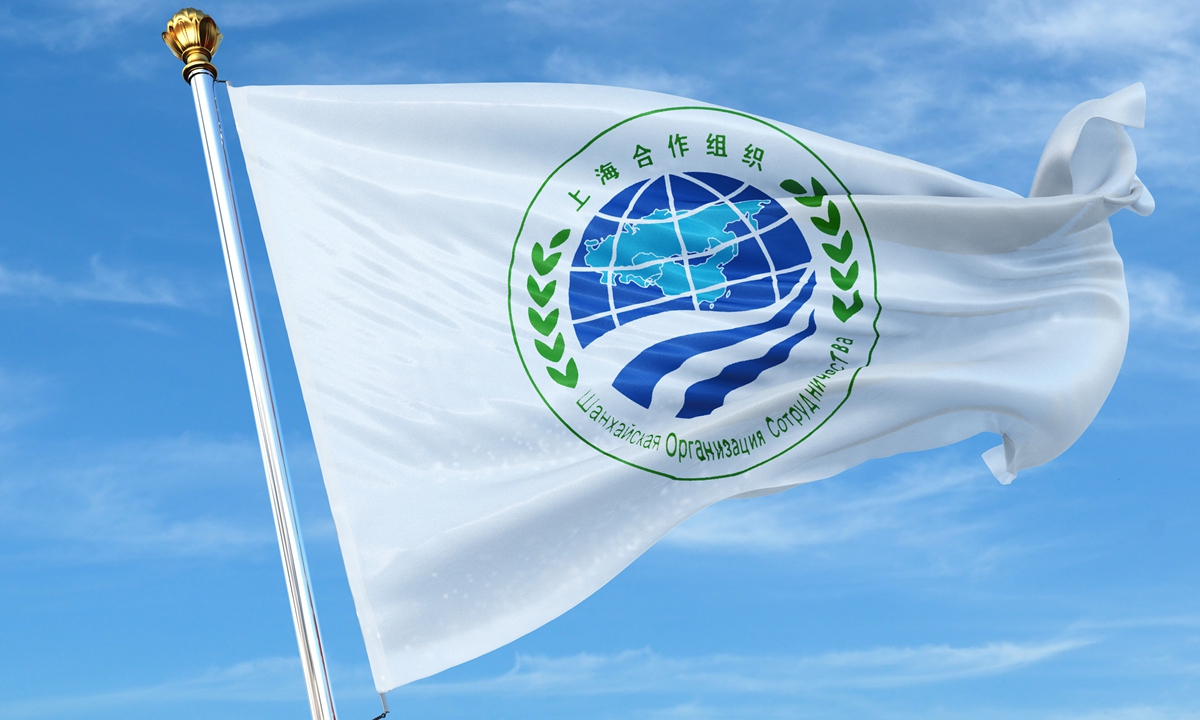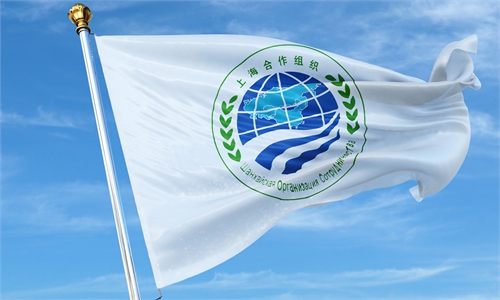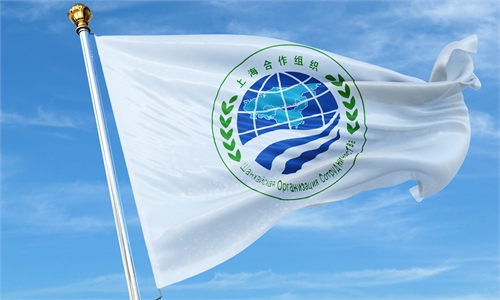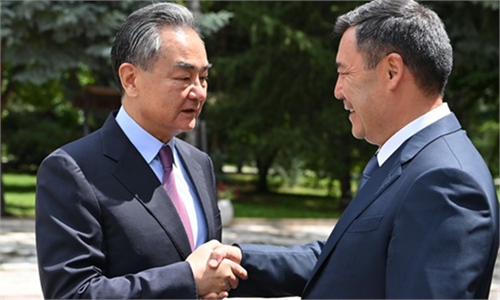China’s top diplomat urges SCO members to maintain strategic autonomy; do not allow external forces to turn region into geopolitical arena

Shanghai Cooperation Organization Photo: VCG
Chinese Foreign Minister Wang Yi on Tuesday called for the Shanghai Cooperation Organisation members to maintain their strategic autonomy, solidarity and cooperation and never allow external forces to turn the region into a geopolitical arena.Wang made the remarks at a meeting of the SCO Council of Ministers of Foreign Affairs that was held in Astana, Kazakhstan on Tuesday.
Wang, who is also a member of the Political Bureau of the Communist Party of China Central Committee, said that currently as the international situation is turbulent and changing, a few countries are pursuing hegemony and power, forming small cliques, establishing hidden rules, engaging in interference and suppression, "decoupling and cutting off ties," and even assisting the "three forces" in the region, with the aim of suppressing the strategic autonomy of the "Global South" and blocking the revitalization path of emerging markets and developing countries.
The "three forces" that Wang mentioned in his remarks refer to terrorism, separatism and religious extremism.
The more chaotic the world becomes, the more we need to adhere to the "Shanghai Spirit," grasp the correct direction, further strengthen and solidify the SCO, more effectively safeguard common interests, respond to various challenges and defend fairness and justice, said Wang.
Wang called for security cooperation, saying that common, comprehensive, cooperative and sustainable security should be ongoing dynamics in the region.
The SCO countries should, taking the Global Security Initiative as a guide, work with the international community to solve security challenges, eliminate the root causes of conflicts, play a leading role in global security governance and contribute to promoting world peace, he said.
Murat Nurtleu, Kazakhstan's Deputy Prime Minister and Minister of Foreign Affairs, welcomed the heads of delegations participating in the meeting in Astana.
The meeting began with a moment of silence in remembrance of Iranian President Ebrahim Raisi and Minister of Foreign Affairs Hossein Amir-Abdollahian, both died in a helicopter accident on Sunday in northern Iran.
SCO's unique role
In March, Kazakh President Kassym-Jomart Tokayev said at a meeting in Boao, South China's Hainan Province, that all leaders of SCO member states plan to take part in the upcoming summit of the association in Astana in July, Russian News Agency TASS reported.
This year's SCO summit must deal with a weighty agenda, which includes discussions on strengthening counter-terrorism cooperation, institutional reforms and expansion of SCO membership, economic and trade cooperation, and cultural and other aspects, Cui Heng, a scholar from the Shanghai-based China National Institute for SCO International Exchange and Judicial Cooperation, told the Global Times on Tuesday.
Cui noted that the meeting of SCO foreign ministers seeks to negotiate the result before the leaders' summit.
One highlight of this year's summit will be SCO expansion, Han Lu, an associate research fellow at the Department for European-Central Asian Studies at the China Institute of International Studies, told the Global Times on Tuesday. The organization will include more countries and its international influence will be further elevated. This suggests the strong appeal the Shanghai Spirit has, Han said.
Belarus plans to become a full member of the SCO in July, Belarusian President Alexander Lukashenko said, as the Belarusian state-run news agency BelTA reported in March.
Wang met with Belarusian Foreign Minister Sergei Aleinik on Monday in Kazakhstan. Wang said that the two countries' heads of state have established a profound friendship as well as solid mutual trust, jointly steering China-Belarus relations into a fast lane.
Saudi Arabia's cabinet also approved a decision to join the SCO last year, Reuters reported.
Speaking at a reception in celebration of the 20th anniversary of the SCO Secretariat held in Beijing in February this year, Wang said that changes unseen in a century are unfolding at a faster pace and the world has entered a new period of turbulence and transformation. He pointed out that there is therefore a greater need for carrying forward the Shanghai Spirit and such a cooperation platform as the SCO.
Currently, the SCO is the largest regional multilateral organization composed of non-Western countries and it focuses on political and security cooperation. This is the uniqueness of the SCO, Cui said.
Cui noted that against the backdrop of rising anti-globalization trend and emerging challenges on especially political and non-traditional security, the current global governance framework cannot meet the needs of addressing security threats. This means the value of the SCO is further highlighted in coping with those challenges.
The SCO, in many aspects, represents a new cooperation model distinct from Western-centric organizations, which seek military expansion and make efforts to form small cliques. The SCO, on the other hand, provides a favorable platform for strengthening South-South cooperation, Qian Feng, director of the research department at the National Strategy Institute at Tsinghua University, told the Global Times on Tuesday.
He said the SCO reflects a new multipolar reality and has increasingly exerted influence in the region. It has played an important role in promoting international fairness, justice, and global governance reform.
Solid cooperation
In their meetings with Wang, the foreign ministers of Russia, Belarus, Kyrgyzstan and Uzbekistan voiced their support for the one-China principle, and expressed their hope of promoting bilateral relations by expanding cooperation.
For his part, Wang told Kyrgyz Foreign Minister Jeenbek Kulubaev on Monday that China supports the government of Kyrgyzstan in maintaining national independence and pursuing a development path that is in line with its own national conditions.
Wang told Uzbek Foreign Minister Bakhtiyor Saidov that China is willing to strengthen cooperation with Uzbekistan in the fields of counter-terrorism, anti-narcotics and combating transnational crimes, to increase cooperation in countering interference and infiltration, and never allow external forces to disrupt Central Asia.
The core of the SCO is equality and mutual respect. Member countries recognize that regardless of the sizes of the countries, they should treat each other with respect and equality, support each other's development paths, and uphold each other's core interests, Han said. She said this is a true manifestation of mutual trust among SCO member countries.
Officials from SCO members also discussed trade and economic cooperation. For example, Wang said that trade volume, especially trade in agricultural products and new energy vehicles, has grown rapidly between China and Kyrgyzstan, and a number of major projects and new projects have been launched in succession.
The SCO framework has a depth and breadth of inclusion across a wide range of fields, including diplomacy, national defense, security, economy, trade, culture, education, transportation, technology and agriculture. The development of the SCO in recent years has helped promote cooperation between China and Russia, as well as between China and Central Asian countries, Qian said, noting that cooperation among these countries within the SCO's multilateral framework continues to expand and deepen.




